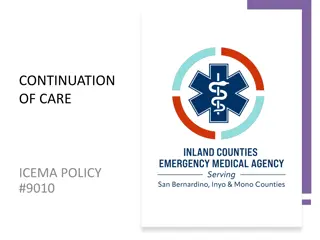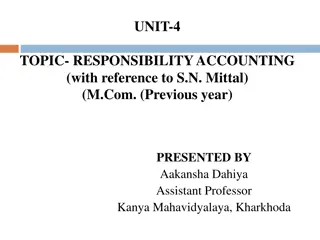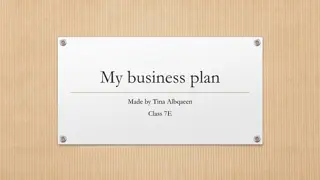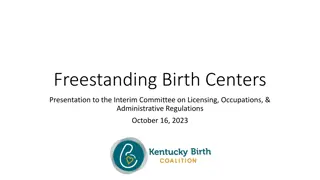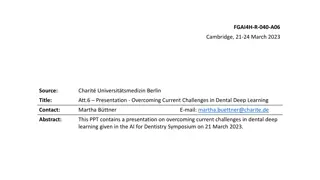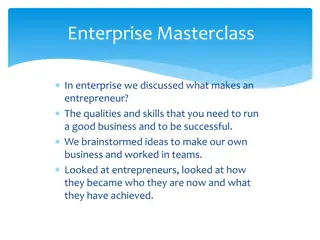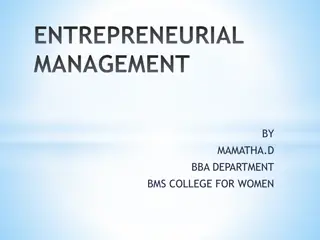Entrepreneur Local Learning Centers
Learn about how income taxation applies to different forms of business ownership in Canada, including sole proprietorship, general partnership, business corporation, and cooperation. Understand the deadlines for filing tax returns, tax deductions, and considerations for incorporation based on profits. Discover the tax advantages of different business structures and when to consider incorporation for your business.
Download Presentation

Please find below an Image/Link to download the presentation.
The content on the website is provided AS IS for your information and personal use only. It may not be sold, licensed, or shared on other websites without obtaining consent from the author.If you encounter any issues during the download, it is possible that the publisher has removed the file from their server.
You are allowed to download the files provided on this website for personal or commercial use, subject to the condition that they are used lawfully. All files are the property of their respective owners.
The content on the website is provided AS IS for your information and personal use only. It may not be sold, licensed, or shared on other websites without obtaining consent from the author.
E N D
Presentation Transcript
Entrepreneur Entrepreneur Local Learning Centers Local Learning Centers
SEMINAR 24: UNDERSTANDING INCOME TAXES FOR BUSINESS OWNERS Whether you intend to have an accountant handle your taxes or you plan to take care of them yourself, it s a good idea to take some time to learn how taxation in Canada will apply to your business.
How Incomes Apply to Forms of Organization Ownership Sole Proprietorship In this structure, the business and the operator are the same in the eyes of tax authorities. Tax law treats a sole proprietorship as an income source for the proprietor. The business s financial profit or loss must be reported and listed in a separate section of the personal income tax form. General PartnershipAny profit or loss must also be reported on each partner s income tax form in the proportion of their partnership share. The deadline for filing an individual income tax return is April 30. As a sole owner or member of a partnership, you are granted a deadline until June 15. However, that interest will be calculated as of May 1 on any tax balance payable. Continued
Organization Ownership Cont d. Business Corporation: Incorporation creates formal ownership shares, creating taxation and legal distance between the company and the owners. - As a business owner, you will need to provide a personal income taxes report and a separate report for your business. Most importantly, the tax deductions a corporation can claim are the same as those of a sole proprietor. - Incorporation declarations must be made within six months of the end of the financial year. However, if the company must pay taxes, it has only two months following the end of the financial year to make the payment without penalties and interest. If your fiscal year ends on March 31, your filing deadline is September 30. Cooperation: an incorporated co-operative, like an ordinary business corporation, is an entity within the meaning of the Income Tax Act and is liable for income tax.
When to Consider Incorporation? In some cases, commercial and civil liability insurance may require the business to be incorporated. Due to the income tax bracket, you should consider incorporating if your business makes a profit of $ 100,000 a year or more. Why? As a sole owner, the average tax rates are 25 % federal and 9 % in Nunavut. Incorporation taxes range around 12 % at this point. As a sole owner, $100,000 of profits has about $25,000 of personal tax. Meanwhile, $100,000 of business profit has about $12,000 to pay in corporate tax. If you then pay yourself with the net profit of $88,000, you will therefore pay $13,000 in personal tax. For example:
What Else? Tax-wise, there are some advantages to being structured as a sole proprietorship, such as: Business losses cannot be written off against other owners income (shareholders). Less administrative work is required, and one tax report for both provincial and federal are to be filled separately.
Incorporation minimizes the risk to shareholders. You can protect your personal assets from seizure in the event of business failure. It is best to incorporate as soon as you take significant business risks (e.g. large outlay for research and development, large inventory and equipment purchases, important investments). Sometimes, a client requires you to be incorporated to work with you. For example, big company such as Walmart requires their vendors to be incorporated.
Other Considerations The cost of an accountant or bookkeeper can more than pay off as they likely know exemptions, opportunities, and tax advantages that you may not be aware of. There is a good reason why they are called professionals! You can also claim your accounting and bookkeeping fees as business expenses. Sole Proprietor or Partnership: Business Corporation: The average cost of hiring a professional ranges from $140 to $450. This can also vary based on your situation and what tax forms you must file for your business. The average cost of tax preparation for small businesses is $300. The cost will range from $500-$1500. The larger and more complex projects would likely see a starting point of $90/per hour, depending on the corporation's size. The cost is also more significant for a business corporation because documents you will need to provide for your income taxes, as explored on the next slide. of the different
Obligations - Sole Proprietorship and partnership: Your business income, after deductions, is considered your annual wage; you report it as professional or business income on a T2125 form for revenue Quebec. The information gathered in the T2125 can be used to fill out form TP-80 Business or Professional Income and Expenses for the federal income taxes report. - Business Corporation: to complete their Income Quebec Tax Return CO-17 and T2 Corporation federal Income Tax Return, you are your own accountant. You must prepare the statements of results as well as the balance sheet. - Annual Updating Declaration: In addition, all registered enterprises must file an annual updating declaration, regardless of whether or not the information in the register needs to be changed. This obligation takes effect the year after the year in which the enterprise first registers. Continued
Obligations Contd. Additionally, you must keep records of your transactions to support your income and expense claims. Stay Organized! Keep a record of your daily income and expenses. There are many record books and bookkeeping systems available. You can use a book with columns and separate pages for income and expenses. Keep your duplicate deposit slips, bank statements, and canceled cheques. Keep separate your personal records and records for each business you run. If you want to keep computerized records, ensure they are straightforward to read.
Should I be Setting Aside Money to Pay Taxes? If you are self-employed, it is best to set money aside for taxes from any and every cheque; otherwise, you will be stuck with a large tax bill at the end of the tax year. It is suggested that you set aside a minimum of 25 percent of your income for tax and other contributions, like RRSPs. You could decide to use Tax installments. You make payments throughout the year to cover the taxes instead of paying one lump sum on April 30. You pay these installments during the year while earning the income, similar to how an employer deducts tax directly from each pay period. Tax installment payments are due by the following dates): March 15, June 15, September 15, December 15. Missing these dates will lead to wage garnishing and other penalties.
Wage Garnishing A wage garnishment is a legal action to collect money on a debt. Under a court order, it lets a credit lender take a part of your paycheque or bank account towards your debt. The Canada Revenue Agency (CRA) can also garnish your wages: Unfortunately, wage garnishment happens when taxpayers are overdue on debt payments. If you fail to fill appropriately or repay their unpaid taxes or make payment arrangements, the CRA can use wage garnishment, bank account freezes, or asset liens/seizures to recover tax debts.
SELF EVALUATION Please select the correct answer by clicking on the box. What is the deadline for filing an individual income tax return? A. April 1 May 30 B. April 30 C. June 15 D.
Congratulations, you are correct! Additionally, as a sole owner or member of a partnership, you are granted a deadline until June 15. However, that interest will be calculated as of May 1 on any tax balance payable. Click here to continue.
Sorry. Please try again. Click here to try again.
SELF EVALUATION As a corporation, can I use my children s deductibles in my business taxes report? No, deductibles concerning anyone under 18 years of age cannot be used in a business tax report. A. No, you must keep your personal income taxes report separate from your business. B. Yes, all expenses you incur can be deducted when running your own business. C.
Congratulations, you are correct! Click here to continue.
Sorry. Please try again. Click here to try again.
GLOSSARY Click on the word to go back to that slide. - Deductibles: For tax purposes, a deductible is an expense that an individual taxpayer or a business can subtract from adjusted total income when completing a tax form. The deductible expense reduces taxable income and, therefore, the amount of income taxes owed.







